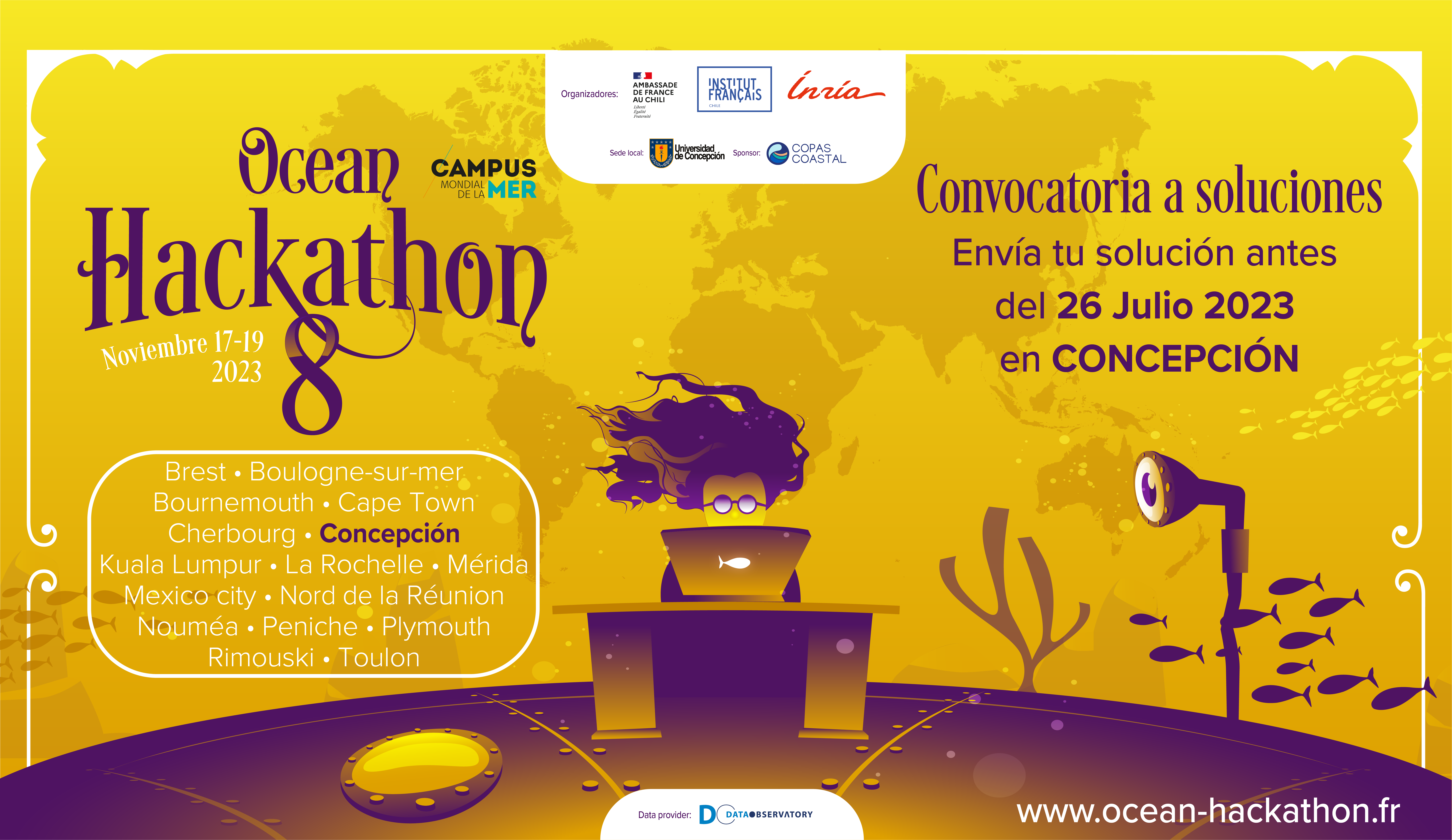
Ocean Hackathon brings together multidisciplinary teams from the scientific-technological ecosystem to develop digital solutions for ocean-related challenges and the maritime community. This competition is organized annually in Chile by the Embassy of France in Chile, the French Institute of Chile, and Inria Chile. For the 2023 edition, the University of Concepción and the COPAS Coastal center join the local organization, with data provided by the Data Observatory.
What are the stages of Ocean Hackathon?
The first step involves a call for solutions, which will be open until July 26th.
The proposals will be selected during the month of August, and the teams that are formed will participate in this 48-hour marathon to develop their prototypes between November 17th to 19th at the University of Concepción. At the end of this marathon, each team will present a pitch to the jury of the Ocean Hackathon, who will choose the winner of the Chilean edition.
Finally, the winning team from the hackathon in each of the 16 participating cities around the world will present their project at the Grand Final of the international competition, which will take place in Brest, France, in December 2023.
What solutions are being sought this year?
The challenge of this edition is "Oceans at Risk: Solutions for the Future of the Marine Ecosystem." With this, the aim is to provide solutions to some of the main dangers that the oceanic system faces by 2030. The solutions presented must address one of these five major risks:
- Risk of loss of ecosystem services: determined by the lack of recreational and tourism spaces (swells, chemical, organic, and acoustic pollution).
- Risk of deoxygenation: determined by the expansion of oxygen minimum zones.
- Risk of loss of marine resources due to fisheries and aquaculture management: determined by the need to optimize extraction processes and port and infrastructure management.
- Risk of loss of information due to lack of monitoring: determined by the need to increase online collection of underwater information.
- Risk of loss of habitability due to pollution: determined by the loss of biodiversity and its quantification.
More about "Oceans at Risk"
The ocean and its ecosystem services are pillars of sustainable development in Chile. It plays a crucial role in climate regulation through carbon capture and contributes to food security through fisheries and resource cultivation. In addition to its presence in the national collective imagination, the ocean and its biodiversity have ensured life on the planet and are intimately connected to the atmospheric and terrestrial systems.
Global change has exacerbated the variability of various aspects that make the ocean vulnerable to significant environmental factors. Pollution (especially plastics), rising global temperatures, deep-water deoxygenation and hypoxic zones, cryosphere decline, and estuarine system alterations are some aspects that currently contribute to the loss of marine productivity and species richness. However, one of the greatest obstacles to preventing and mitigating risks in the ocean is related to the scales of variability, both spatially and temporally.
The "Oceans at Risk" challenge seeks to provide solutions for some of the main dangers facing the oceanic system by 2030, in order to contribute to a healthy, safe, predictable, and sustainable ocean.
The proposed solutions can help improve the understanding of risk factors and also mitigate them. Additionally, they can aim at better resource and process management and adaptation of coastal populations.
Who is the call aimed at?
The call is aimed at entrepreneurs, researchers, and students in the field of science and technology from across the country, especially in areas such as digital sciences, marine biology, oceanography, economics, or communications.
Those who apply to the call can do so as individuals (natural persons) or on behalf of their organization, research center, startup, or other entities (legal entities).
Why apply to the Ocean Hackathon?
- The organizers of the Ocean Hackathon will propose new team members if you wish to reinforce your team and create the best multidisciplinary team.
- You will have access to tools and data provided by partners of the Ocean Hackathon (such as the Data Observatory in Chile and international data providers).
- You will receive guidance from coaches throughout the weekend, benefiting your technical, scientific, and project-related experience.
- You will receive specific training, such as in the 2022 edition, on machine learning with scikit-learn through the Inria Academy program, or on intellectual property or communication to deliver the best pitch for the Ocean Hackathon.
- You will discover or strengthen your connections with the scientific and innovative community of the country and expand your networks.
- You will have the opportunity to engage with an international community and discover a panel of highly interesting projects.
- And if you win the Ocean Hackathon in Chile, we will support you to present your solution at the Grand Final and travel to Brest, with the possibility of winning one of the prizes reserved for the top three pitches in the world.
